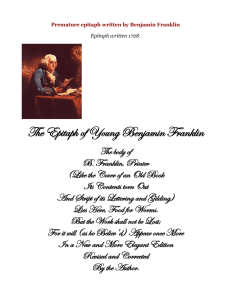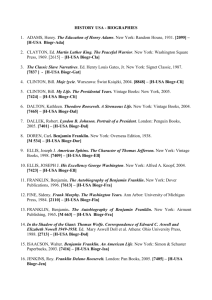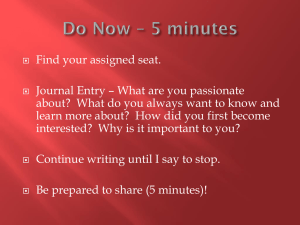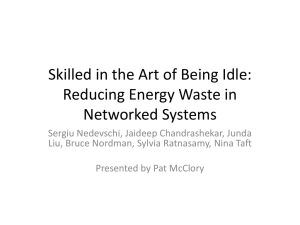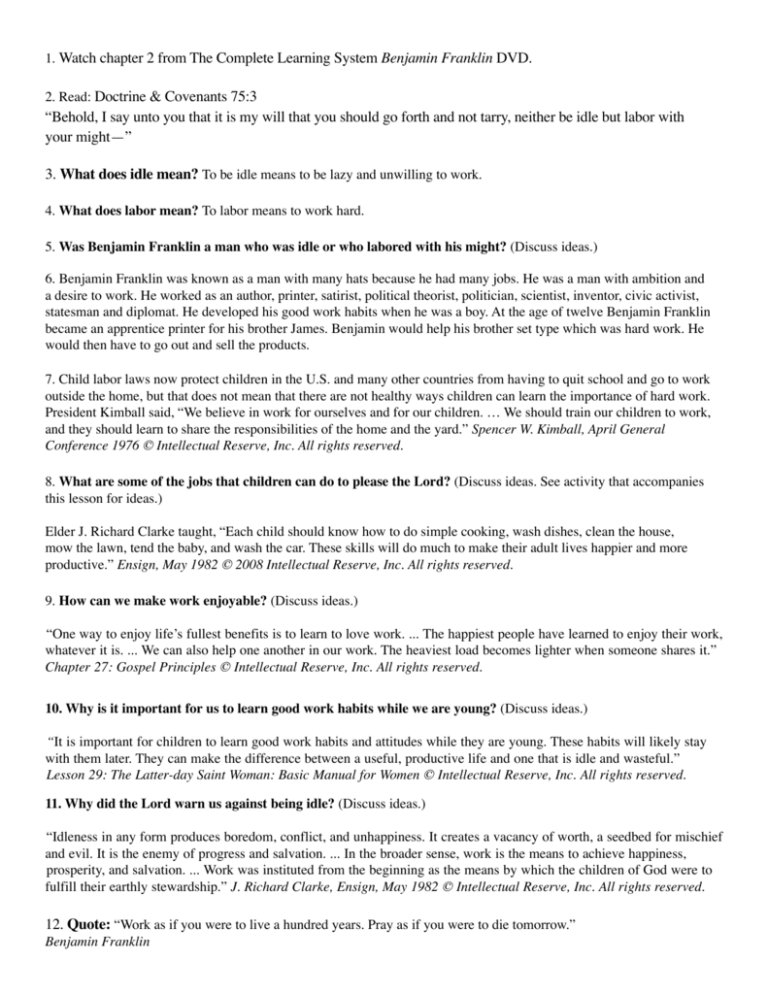
1. Watch chapter 2 from The Complete Learning System Benjamin Franklin DVD.
2. Read: Doctrine & Covenants 75:3
“Behold, I say unto you that it is my will that you should go forth and not tarry, neither be idle but labor with
your might—”
3. What does idle mean? To be idle means to be lazy and unwilling to work.
4. What does labor mean? To labor means to work hard.
5. Was Benjamin Franklin a man who was idle or who labored with his might? (Discuss ideas.)
6. Benjamin Franklin was known as a man with many hats because he had many jobs. He was a man with ambition and
a desire to work. He worked as an author, printer, satirist, political theorist, politician, scientist, inventor, civic activist,
statesman and diplomat. He developed his good work habits when he was a boy. At the age of twelve Benjamin Franklin
became an apprentice printer for his brother James. Benjamin would help his brother set type which was hard work. He
would then have to go out and sell the products.
7. Child labor laws now protect children in the U.S. and many other countries from having to quit school and go to work
outside the home, but that does not mean that there are not healthy ways children can learn the importance of hard work.
President Kimball said, “We believe in work for ourselves and for our children. … We should train our children to work,
and they should learn to share the responsibilities of the home and the yard.” Spencer W. Kimball, April General
Conference 1976 © Intellectual Reserve, Inc. All rights reserved.
8. What are some of the jobs that children can do to please the Lord? (Discuss ideas. See activity that accompanies
this lesson for ideas.)
Elder J. Richard Clarke taught, “Each child should know how to do simple cooking, wash dishes, clean the house,
mow the lawn, tend the baby, and wash the car. These skills will do much to make their adult lives happier and more
productive.” Ensign, May 1982 © 2008 Intellectual Reserve, Inc. All rights reserved.
9. How can we make work enjoyable? (Discuss ideas.)
“One way to enjoy life’s fullest benefits is to learn to love work. ... The happiest people have learned to enjoy their work,
whatever it is. ... We can also help one another in our work. The heaviest load becomes lighter when someone shares it.”
Chapter 27: Gospel Principles © Intellectual Reserve, Inc. All rights reserved.
10. Why is it important for us to learn good work habits while we are young? (Discuss ideas.)
“It is important for children to learn good work habits and attitudes while they are young. These habits will likely stay
with them later. They can make the difference between a useful, productive life and one that is idle and wasteful.”
Lesson 29: The Latter-day Saint Woman: Basic Manual for Women © Intellectual Reserve, Inc. All rights reserved.
11. Why did the Lord warn us against being idle? (Discuss ideas.)
“Idleness in any form produces boredom, conflict, and unhappiness. It creates a vacancy of worth, a seedbed for mischief
and evil. It is the enemy of progress and salvation. ... In the broader sense, work is the means to achieve happiness,
prosperity, and salvation. ... Work was instituted from the beginning as the means by which the children of God were to
fulfill their earthly stewardship.” J. Richard Clarke, Ensign, May 1982 © Intellectual Reserve, Inc. All rights reserved.
12. Quote: “Work as if you were to live a hundred years. Pray as if you were to die tomorrow.”
Benjamin Franklin


